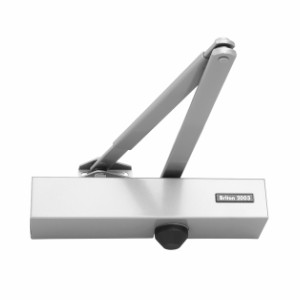Door closer lubrication and cleaning for long life
The door closer is an essential piece of door hardware for a commercial building or in a residential setting. It has the role of ensuring a door closes securely and effectively. This can have a range of benefits, such as security, fire safety, noise control and energy efficiency. The door closer removes the need for manual intervention and so someone with limited mobility or other accessibility issues does not need to close a door once they have opened and passed through it. So the door closer has an important function in a building, and it is also important that it is consistent and reliable, and for this reason, regular maintenance is essential.
Why is maintenance of a door closer important?
Like many functional features around a home or in a commercial building, we often don’t really notice them until they are not working, and the door closer is a good example of that. In a busy building with high traffic, a door can be opened repeatedly on many occasions during a day, and in a school, a hospital or a busy retail store, for example, this could be as many as thousands of cycles every day. If a door closer isn’t regularly maintained, however, this can start to cause numerous issues:
- If the door closer malfunctions it won’t automatically close the door and that can cause issues with security, fire safety, noise and temperature control.
- A door closer could slam shut due to a wind tunnel and injure someone, damage the door or make a repeated loud noise, if it is not working properly.
- The door closer may make the door much harder to use and to close. If parts seize up it may require excessive force to open and close the door which could be a problem for some people.
- Regular maintenance of a door closer will extend its lifecycle and will mean you get much better value for money for your investment, and if you are needing to install a lot of door closers in a commercial building, for example, this can make a considerable cost saving.
How to maintain your door closer
Door closers are relatively simple devices, but there is a lot you can do to maintain them. And there are many different types and designs of door closer, such as hydraulic and concealed door closers. But the most popular types are overhead door closers which have a pivoted arm and a two-piece unit attached to both the door and the door frame. We will look at the maintenance process for these first of all.
- Cleaning – The repeated use of door closers over a long period means that the main unit will see a build-up of oil, dirt and debris. This is just a natural by-product of the opening and closing process. You should regularly clean the mechanism to remove this loose build-up of materials. Use a damp cloth to clean and avoid using any harsh chemicals.
- Lubrication – The moving parts of this type of door closer include the hinges, the pivots and the arm. You should use a silicon-based lubricant to reduce the friction and wear that occurs with these features, and this will help to extend the life of the door closer. It is important to be quite sparing with the application of the lubricant, if you apply too much of this type of material it can attract more dirt and this will just result in the mechanism clogging up.
- Screws – Because your door closer is working hard over repeated cycles every day, this does mean that screws, bolts and brackets can work loose, even if they were properly installed initially. You should inspect these and tighten them all up. This will also help the door alignment and make sure the door closes smoothly and effectively.
- Test – Once the system has been fully cleaned, lubricated and tightened you should repeatedly test it to ensure the door closer is working properly. You may need to adjust the closing and latching speed to get it back to where it was previously. Test this several times to make sure the opening and closing speed and action is consistent, and that the latching speed is also practical and ensures the door closes correctly.
If you have a hydraulic door closer, many of the same maintenance tips outlined above will also apply. However, you should also inspect the unit for oil leaks. This is a common problem because the hydraulic seals sometimes wear with repeated use, and this can lead to oil leaks. In this case the seal will need replacing, and the fluid in the unit will need replenishing.
And if your door closer is a concealed unit – this could be concealed in the door itself or in the floor – the main maintenance process is to inspect the internal housing and to clean and lubricate it. Again this can get clogged up with loose materials and general debris, and over time this could impact on the opening and closing action of the door if not cleaned and maintained.
Order good quality door closers from MB Direct
At MB Direct we have a large range of door closers for many different applications, so check out our range and order online today.